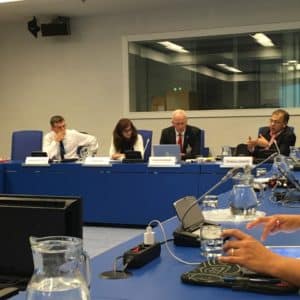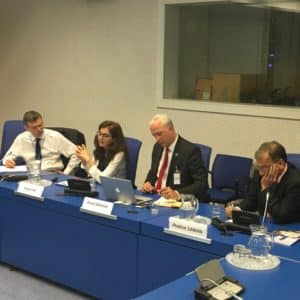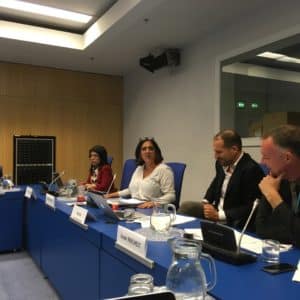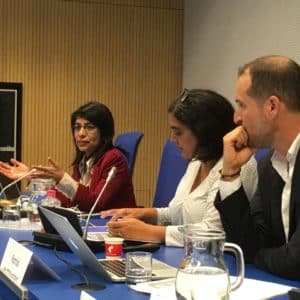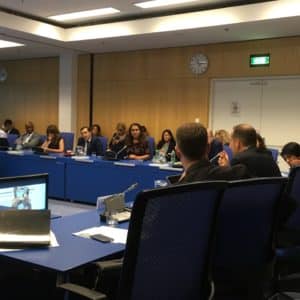Ninth session of the Implementation Review Group (9th IRG)
Vienna, 3–5 September 2018
-
7th Briefing for NGOs, 5 September 2018
-
Panel discussion: Effective Disclosure
-
Panel discussion: Sustainable Development Goals and UNCAC
-
Panel discussion: A human rights-based approach to corruption
-
Written submissions by NGOs
-
Additional information
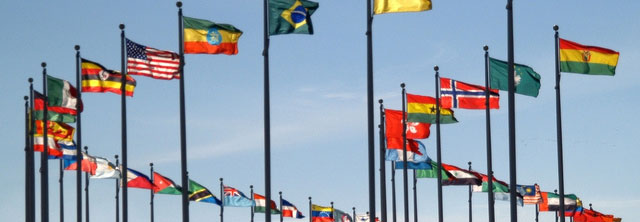 Image: Creative Commons, Flickr / theclyde
Image: Creative Commons, Flickr / theclyde
The resumed 9th session for the Implementation Review Group (IRG) for the UN Convention against Corruption (UNCAC) took place from 3–5 September 2018, which started in June 2018, at the UN Office in Vienna. The three main agenda items were a review of the implementation of the Convention, the performance of the review mechanism, and technical assistance to enhance countries’ implementation efforts.
The Implementation Review Group (IRG) Briefing for NGOs is a pendant to the main IRG meeting that has a session in June each year. On 5 September, UNODC provided an IRG Briefing for NGOs (see Programme for the Briefing).
UNCAC Coalition Special Events, 5 and 6 September 2018
As part of the NGO Briefing, the UNCAC Coalition organised three thematic panel discussions on the following topics:
Effective Disclosure – Applying asset and interest declarations to strengthen accountability of public officials and manage conflicts of interest
Wednesday, 5 September 2018, 13:30 – 15:00
Organiser: UNCAC Coalition
Speakers:
- Eka GIGAURI, Executive Director, Transparency International Georgia with a presentation on “Effective Disclosure in Georgia” (.PPTX)
- Dr. Tilman HOPPE, Consultant and Expert on Asset Declarations with a presentation on “Asset and Interest declarations” (.PDF)
- Paul Radu, The Organized Crime and Corruption Reporting Project (OCCRP)
Moderator: Cynthia GABRIEL, Center to Combat Corruption and Cronyism (C4 Center), Member of the UNCAC Coalition’s Coordination Committee
This session highlighted good practices in implementing mechanisms of asset and interest disclosure. Particular emphasis was given to examples of regulations in Georgia where Transparency International Georgia has uncovered 70 particular cases of nepotism, including of newly appointed high-level Georgian officials who hired relatives within the first two or three months of assuming their positions.
The discussion highlighted that civil society can play a crucial role in monitoring asset declarations of public officials or in detecting conflicts of interest, for example, linked to public procurement. The participants highlighted that it is crucial for the information contained in officials’ declarations of assets and interests to be accessible to the public online, in a standardised, user-friendly and machine-readable format. If the data is not available online, the value of asset and interest declarations diminishes.
To accurately monitor asset declaration on an international level, oversight bodies should be capacitated to exchange information on asset declarations as well as on conflicts of interest.
OCCRP showcased how money laundering schemes work and how its journalists use asset declaration data in their investigative reporting which has uncovered several money laundering schemes, so-called laundromats. The organization uses and republishes data about politically exposed persons (PEPs) and company ownership by indexing asset declaration statements and linking them with other data sets.
Sustainable Development Goals and UNCAC
Thursday 6 September 2018, 09:00 – 10:30
Organisers: UNCAC Coalition, ARTICLE 19 and the United Kingdom
Speakers:
- Andrew PRESTON, Head, Joint Anti-Corruption Unit, UK Government
- Angela ME, Chief of Research and Trend Analysis Branch, UN Office on Drugs and Crime (UNODC)
- Iftekhar ZAMAN, Executive Director, Transparency International Bangladesh
Moderator: David BANISAR, Senior Legal Counsel, Article 19 , Vice-Chair of the UNCAC Coalition
The panel examined how the UNCAC and the SDG processes complement and support each other and how each can be used to support and promote the other over the upcoming year.
An important question is how to measure corruption in the context of the implementation of SDG 16. In the medium term, it is necessary to implement surveys on population and business with a set of proxy or vulnerability indicators to improve data collection on corruption.
In the long run, criminal justice recordings and statistical systems need to be improved. Surveys should cover various areas, not just bribery. A handy instrument in this regard is the international classification of crime for statistical purposes (ICCS). Statistical data could be particularly interesting when it comes to comparing demographic sub-groups, such as gender differences in corruption risk exposure.
The UK recognized the existence of a gap on data when it comes to corruption and the SDGs. The lack of reliable statistics was also identified in the UNCAC review process in the UK. International organisations that provide data are, for example, GRECO or the OSCE.
The government of Bangladesh does not recognize the existence of bribery in its data collection efforts. Consequently, it is difficult to find reliable statistics on corruption. Transparency International Bangladesh conducts biannual household surveys on corruption which are directly linked to SDG 16.5. The studies show that the police sector is considered as the most corrupt in Bangladesh: 77% of people who interacted with the police had to pay bribes, when it comes to the judiciary, it was 68%.
A human rights-based approach to corruption
Thursday 6 September 2018, 13:30 – 15:00
Organisers: UNCAC Coalition, Transparency International and Switzerland
Speakers:
- Jason REICHELT, Senior Advisor, UN Office of Drugs and Crime (UNODC)
- Richard LAPPER, Human Rights Officer, UN Office of the High Commissioner for Human Rights (OHCHR)
- Patrick MUTZENBERG, Director, Centre for Civil and Political Rights with a presentation on “Human Rights and Corruption” (.PPTX)
Moderator: Juanita OLAYA, Chair of the UNCAC Coalition
Panellists focused on the nexus between acts of corruption and the violation of certain human rights. Discussants reiterated the importance of identifying potential human rights violations both in cases of grand corruption as well as petty corruption. UN Human rights bodies (based in Geneva) have frequently addressed corruption in their recommendations and comments.
UNCAC articles focusing on prevention frequently refer to human rights-related issues such as transparency, access to information, or the participation of civil society. However, it is challenging to make specific recommendations on human rights in the context of the UNCAC.
Several governments in the Middle East have recently prioritized legislative steps towards improving access to information, possibly in view of implementing SDG16 and the upcoming second cycle UNCAC reviews.
Written submissions by NGOs
The IRG sessions are open to UNCAC signatory states and intergovernmental organisations. Civil society organisations have not been permitted to participate as observers, due to opposition from a small but influential group of countries. This is problematic and inconsistent with international human rights standards, Goal 16 of the Sustainable Development Goals and with transparency and participation standards in the Convention itself.
Instead of including civil society representatives in its meetings, since 2011, the IRG holds a Briefing for non-governmental organisations (NGOs). During these briefings, UNODC provides representatives of civil society organisations with information on the status of the review process and review discussions, and there is also an opportunity for those representatives to ask questions and make presentations on key issues to the government representatives who also attend the meeting.
NGOs are permitted to make written submissions to the IRG. The UNCAC Coalition submitted the following documents, which have also been published on the UNODC’s website:
- UNCAC Coalition Statement: Civil Society Statement on Asset Recovery
- UNCAC Coalition Statement: Effective Disclosure
- UNCAC Coalition Statement: Sustainable Development Goals and UNCAC
- UNCAC Coalition Statement: A Human Rights-based Approach to Corruption




